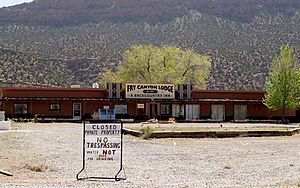Fry Canyon, Utah facts for kids
Quick facts for kids
Fry Canyon
|
|
|---|---|

Fry Canyon Lodge, one of the few structures in the area, April 2006
|
|
| Country | United States |
| State | Utah |
| County | San Juan |
| Founded | 1950s |
| Abandoned | Late 1950s |
| Named for | The canyon of the same name |
| Elevation | 5,374 ft (1,638 m) |
| GNIS feature ID | 1435562 |
Fry Canyon was once a small community in San Juan County, Utah, United States. It was located within Fry Canyon itself, just south of White Canyon. You can find it about 50 miles (80 km) west of Blanding on State Route 95.
Contents
What Was Fry Canyon?
Fry Canyon was a special kind of town called a boom town during the 1950s. A boom town grows very quickly, often because of a sudden discovery like gold or, in this case, uranium. People moved there to work in the uranium mines.
The Fry Canyon Lodge opened its doors in 1955. It was a place for people living and working in the area to stay or gather. However, the lodge closed in 2007.
From Boom Town to Ghost Town
Fry Canyon was a tiny hamlet, which is a very small village. But after the uranium mining slowed down, people started to leave. Now, it is known as a ghost town. A ghost town is a place where most or all of the people have moved away, leaving empty buildings behind.
Fry Canyon is about 19 miles (31 km) west-southwest of Woodenshoe Butte. It is also about 8 miles (13 km) west-northwest of Natural Bridges National Monument, a famous natural landmark.
Cleaning Up the Environment
In the past, there were some industrial activities near Fry Canyon. From 1957 to 1960, a mill processed uranium ore. Later, from 1963 to 1968, there was an operation to extract copper. These activities, located at Fry Spring, caused some environmental issues.
Over time, certain substances like uranium, copper, and radium got into the groundwater. This meant the water underground in Fry Creek was not as clean as it should be.
How They Cleaned It Up
To fix this, the U.S. Geological Survey stepped in. They worked with the U.S. Environmental Protection Agency and other groups. Their goal was to clean up the water.
They installed special barriers underground. These barriers were designed to clean the water as it flowed through them. Different materials were used in these barriers to help remove the unwanted substances. The U.S. Bureau of Land Management now takes care of the site.
 | Chris Smalls |
 | Fred Hampton |
 | Ralph Abernathy |



